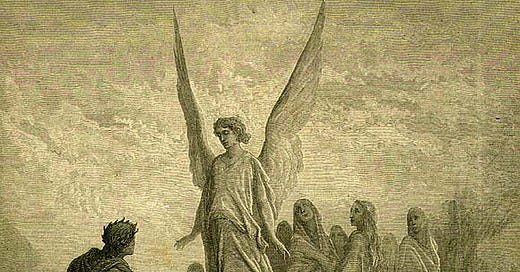Souls from Purgatory, Heavenly Rogationists?
“Every human person possesses an infinite dignity, inalienably grounded in his or her very being… (Dignitas Infinita [DI], 1)”. Why is this? It is because he or she is created in God's Creator's image and likeness (cf., Gen 1:26-27). Disrespecting man, then, is tantamount to disrespecting his Creator. God has given man the ontological dignity rooted in his being the Creator of him. This cannot be erased from him, which will remain valid beyond any circumstances (cf., DI, 7). This sublime human dignity creates an intrinsic connectivity that longs for God. “They think of God, loving him, longing for him, being eager for him, and desiring him [always] (RA, p. 150)”.
But man preferred to disobey God’s order, going against his Creator’s will, and consequently, death has entered human existence. Greed, founded on pride, due to inordinate attachment to creatures is the root of this all (cf., RA, p. 502). The death that we are talking about here could signify both physical and spiritual death.
Even if man is corrupted after his fall into sin, nevertheless, the image of God in him has never been and will never be erased. Although his filial relationship with God has turned upside down, the flame of his longing for his Creator keeps burning. At the sight of his image in man in purgatory, Jesus’ Heart melts in intimate sorrows crying out with David “what has the shedding of my blood gained?... the pains of hell surrounded me! (RA, p. 466).”
Though man is far off God, nevertheless, he still misses his most loving yet offended God. However, this missing of God will turn out to be his most bitter pain because souls in purgatory, according to St. Hannibal Mary, “are always on the point of taking off to God, but they cannot; they love God, but do not see His face; they are queens of paradise, but are taken into custody in purgatory; exile is over, but they do not enter their homeland (RA, p. 150).” “Dreadful is the soul’s transfer from earthly life into purgatory. Without knowing how, the soul finds itself in the midst of the burning whirls overturned by the surrounding flames that penetrate inside, making it burn like a flame (RA, p. 149).”
The souls in purgatory are helpless, almost hopeless, in front of the severe punishment they are facing, and yet they cannot pray for themselves (cf., RA, p. 150); they cannot do anything by themselves. And to think, they are our brothers and sisters in the Christian faith! They wail and agonize for the pain they are in. The most compassionate Heart of Jesus bleeds at the sight of them, intimately begging us to pray for these sorrowing, helpless souls.
Praying for the souls in purgatory is, therefore, our Christian duty and obligation, first of all, because the Heart of Jesus suffers with, for, and in them. We need to console the most compassionate Heart of Jesus by praying for these souls so that their suffering may end now and, consequently, enter heaven. We pray for their release from this immense suffering in purgatory with their human dignity restored and welcomed by God in heaven among his saints. Entering heaven, through the intercession of the Rogationists and the entire Rogate Family, they become themselves heavenly Rogationists without many ceremonies, joining among and along the myriads of saints praying for more holy vocations for the Church. With this prayer, we gain good and holy laborers in the vineyard of the Lord, not for earth anymore but for heaven!
Obtaining good and holy laborers for the Church? Is this not perhaps the goal of our Congregation? (cf., RA, p. 225).
Fr. Marcelino Diaz II, RCJ, is currently the Responsible for the Rogamina Community of the St. Matthew Province in Mina, Iloilo, Philippines. The Rogamina Community aims to follow Jesus’ call for unceasing prayer, especially for more and holy vocations, in the monastic-contemplative lifestyle.



